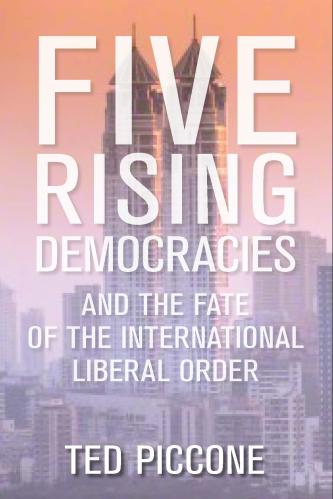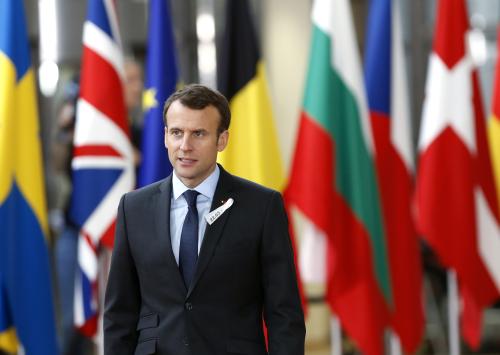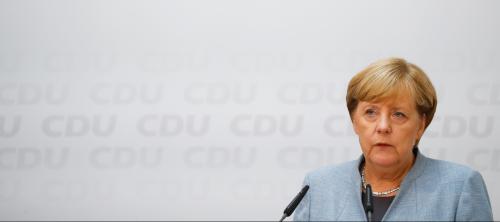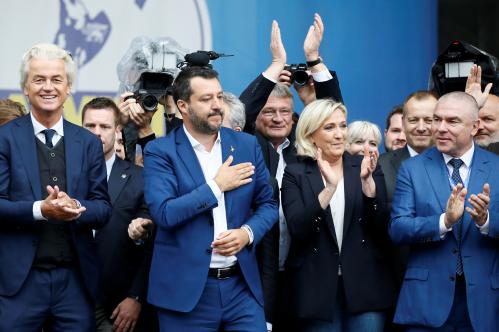The rise of populism, mostly right-leaning, is the most important European political development of the 21st century. It has eaten into support for traditional center-right parties while dealing a knock-out blow to the center-left. The result is the end of the center-left/center-right duopoly that has dominated European politics since the end of World War II. Party systems throughout Europe have fragmented, and most have shifted toward the right. And the rise of populism has opened the door to increased Russian influence throughout Europe.
Early on, many analysts believed that the rise of populism reflected mainly the economic distress created by the protracted Great Recession. As it waned, they hoped, so would the populist challenge. But even as Europe’s economic recovery has gathered pace and unemployment has declined, the populist surge has continued. It is now evident that populism draws strength from public opposition to mass immigration, cultural liberalization, and the perceived surrender of national sovereignty to distant and unresponsive international bodies. If economic arguments had determined the outcome of the Brexit vote, Britain would have remained in the EU. If economic growth had been decisive in Poland, which enjoyed the faster growth rate in Europe between 1989 and 2015, the populist Law and Justice Party would never have become the country’s dominant political force.
Immigration raises cultural and security concerns as well as fears of economic displacement, and it weakens the legitimacy of transnational institutions that are seen as preventing sovereign peoples from using national political means to protect themselves against the threatening developments. Left unaddressed, the rise of anti-immigrant, anti-internationalist sentiment, which has shifted the political balance within Europe, could have grave consequences for liberal democracy itself.
Left unaddressed, the rise of anti-immigrant, anti-internationalist sentiment, which has shifted the political balance within Europe, could have grave consequences for liberal democracy itself.
Emmanuel Macron’s decisive victory over Marine Le Pen and the National Front in last summer’s French elections led many observers to hope that this wave had crested. Subsequent events belied their optimism. In September 2017, the Alternative for Germany (AfD) won 12.6 percent of the vote and entered the Bundestag with 94 seats, upsetting Germany’s post-war political order. In October, anti-immigrant businessman-turned-politician Andrej Babis led his ANO Party to victory and became the Czech Republic’s prime minister. Also in October, the Freedom Party of Austria won 26 percent of the popular vote, up from 20.5 percent in the previous election, and joined the governing coalition. In January 2018, Czech President Milos Zeman’s forceful anti-immigrant stance contributed to his narrow victory over a liberal internationalist challenger. In March, the anti-establishment 5 Star Movement scored significant gains and became Italy’s largest party, while the virulently anti-immigrant League jumped from 4 percent to 18 percent, surpassing Silvio Berlusconi’s Forza Italia to become the dominant force on the right.
The rise of the populist right has coincided with a catastrophe for the center-left. A recent survey showed support for Germany’s center-left SPD shrinking by 5 points since the September election and that it had fallen behind the AfD for the first time. The Socialists, France’s ruling party, received just 7 percent of the vote in last year’s presidential election. In the Netherlands, the Labour Party’s share of the vote fell from 24.8 percent in the 2012 general election to just 5.7 percent in 2017, reducing its parliamentary representation from 38 seats to 9. The Czech Social Democrats, who had received nearly one-third of the popular vote as recently as 2006, collapsed in the 2017 elections, winning only 7.3 percent of the popular vote and 15 seats in parliament, down from 50 in 2013. In Italy, support for the Democratic Party fell to just 19 percent, and its leader, former Prime Minister Matteo Renzi, felt compelled to resign. Even in Scandinavia, long a bulwark of social democracy, the once-dominant center-left parties are in decline, and nationalist parties with nativist tendencies are growing.
Under pressure, center-right parties have felt compelled to adjust by shifting toward populist policies and rhetoric. During the 2017 Dutch election, center-right Prime Minister Mark Rutte castigated immigrants who “don’t want to adapt, attacking our habits and rejecting our values, who attack gay people, who shout at women in short skirts, or call ordinary Dutch people racist.” His blunt message: “Act normal or go away.” The coalition he formed after the election embraced populist-influenced policies on immigration and national identity. Similar shifts are evident among center-right parties in Scandinavia. In Italy, Silvio Berlusconi, who early in the 2018 campaign had pledged to serve as a counter-balance to the League’s radical anti-immigrant stance, ended up endorsing the deportation of more than 600,000 refugees who had arrived since 2015.
In Germany, Chancellor Angela Merkel’s decision in 2015 to open the doors to refugees from Syria and other zones of distress triggered a crisis within the EU and sparked the rise of the anti-immigrant AfD. She justified her decision in principled terms against the backdrop of Germany’s history. But after the disastrous election of September 2017, which weakened Merkel’s Christian Democratic Union (CDU)/Christian Social Union (CSU) bloc, the new coalition agreement between the CDU/CSU and the Social Democrats called for managing and limiting migration to prevent a repetition of the 2015 refugee influx, capping the number of family members who will be allowed to join migrants living in Germany without full refugee status, and strengthening efforts to integrate migrants into German public life.
Populist governments in Hungary and Poland have intensified their efforts to weaken core liberal institutions such as a free press, independent civil society, and constitutional courts. Majorities in both countries increasingly are defining their national identity in exclusionary ethnic and religious terms, and anti-Semitism in on the rise. With rhetoric and imagery reminiscent of the 1930s, Hungary’s Viktor Orbán has castigated Hungarian-born Jewish financier George Soros as the architect of the European refugee crisis. After Poland criminalized public discussion of its role in the Holocaust, the Polish prime minister characterized some Jews as collaborators in the destruction of European Jewry.
Because President Vladimir Putin’s embrace of ethno-nationalism and religious traditionalism has proved attractive to populist movements, their rise has strengthened Russian influence throughout Europe. He offers an attractive model of renewed, unapologetic patriotism and national confidence. He has shown that when liberal democracy is not deeply rooted, democratic governance failures can open the door to authoritarianism that enjoys widespread support, despite the erosion of individual liberties and the rule of law.
Whether Hungary and Poland turn out to be harbingers of Europe’s fate depends on the wisdom and skill of its political leaders in the years just ahead. This means, in particular, adopting policies on immigration and refugees that the peoples of Europe can live with. These policies will fall short of the lofty ideals Angela Merkel invoked in 2015, but they will increase the odds that liberal democracy can resist continued corrosion from within.










Commentary
The rise of European populism and the collapse of the center-left
March 8, 2018